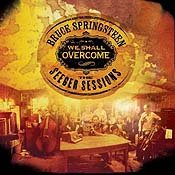 Is the Boss over the hill? Dan Bern thinks so.
Is the Boss over the hill? Dan Bern thinks so.
You know the story about Woody Guthrie on his death bed handing over the reigns of the folk movement to a young Bob Dylan? This song by Dan Bern (from the album Smartie Mine) suggests that Bruce Springsteen ought to do the same with him.
Talkin’ Woody, Bob, Bruce & Dan Blues
In fact, he goes so far as to imagine breaking into Springsteen’s house in the middle of the night:
Well, I found the Boss asleep in bed
Pillows piled up round his head
I turned on the light took off my coat
Stuck a theromometer down his throat
Said don’t talk
You look pale, Boss
Not at all well
Highlights include an increasingly hilarious progression of the story as Bern tries to convince Springsteen that he is sick and dying, a shockingly good impersonation (both in terms of voice and lyrics), and the conclusion when Springsteen tosses Bern out of the house and Bern mutters “surprising strength for a dying man…”
Why bring this up? Well, as you most likely already know, Springsteen has released yet another album this year (surprisingly prolific for a dying man). If you read my list of Best Albums of 2005, you know that Devils and Dust was #17. And if you read my post about Reason to Believe you know that I love Springsteen a whole lot.
So, when I heard that he had another new record (We Shall Overcome: The Seeger Sessions) coming out, I was very excited. When I found out that it wouldn’t include any Springsteen originals and was merely a bunch of songs from old Pete Seeger albums, I was less excited. I’ve always thought that Springsteen was at his best when he wrote songs that transcended (rather than dwelled in) the traditional folk genre.
That said, I still had to get record. And I have to admit I’ve been pleasantly surprised. Most significantly because it calls attention to the fact that while the Boss is a great songwriter, at heart he’s still a performer more than anything else. And on this record, he and the Seeger Session band perform their heart out.
If the Born to Run era Springsteen was a wide-eyed kid, the current incarnation is a grizzled veteran: battle-hardened but unbroken, and with the same fundamental optimism. Many of these songs I’ve known since I was a little kid (John Henry, and Erie Canal, for example) but I’ve always thought of them as quiet banjo-tunes to be sung around a campfire. Springsteen reinterprets them as rambunctious musical assaults.
“Old Dan Tucker” is the clear highlight, kicking things off with a bang as the band romps through a song over 150 years old, giving it new life. “Mrs. McGrath” is another standout track, an old Irish song focused on a mother who welcomes her legless son home from war. An anti-war song to be sure, but like most truly great Springsteen songs, it is a story about people rather than simply concepts. “O Mary Don’t You Weep” has an extended gospel closeout, and “Shenandoah” is quietly beautiful.
The whole record was recorded in two days. No overdubs, no adornment, no frivolties. This brings to mind Nebraska, almost 25 years old now, when Springsteen tossed out the produced recordings and simply released the raw acoustic demos. In doing so, he created a significant split among his admirers between those who appreciate the realism as he delves into the madness and pain of life and those who are suffocated by the bleakness.
Something similar may happen here, which I think is fitting since I see this album as a bit of a mirror image to Nebraska. Both are stripped bare, but while Nebraska was sparse and quiet, here that stripping-down creates a gritty and triumphant sound. And, most importantly, it just sounds fun. Which is refreshing since the pure joy of music and life have always been implicit in his music, but rarely does he just let it all out. And it’s important to show that an album of folk songs can also be full of in-your-face rock and roll.
All that said, it does suffer from the fact that someone else wrote the songs. I think a compelling case could be made that Springsteen is one of the greatest songwriters of all time and while a part of that shows up here in the arrangement and approach to the songs, I can’t help but think that if he strove to write his own songs, they would be even better.
But ultimately, that project would miss the point. We Shall Overcome is not about creating a folk masterpiece – it’s about paying homage to the folk tradition that nurtured him, and having a chance to give his own interpretation of these songs of tremendous historical importance. It will never be one of my favorite Springsteen records, but it is nevertheless an important milestone for an important career.
So is the Boss over the hill? No way.
A couple songs:
Old Dan Tucker
Mrs. McGrath
